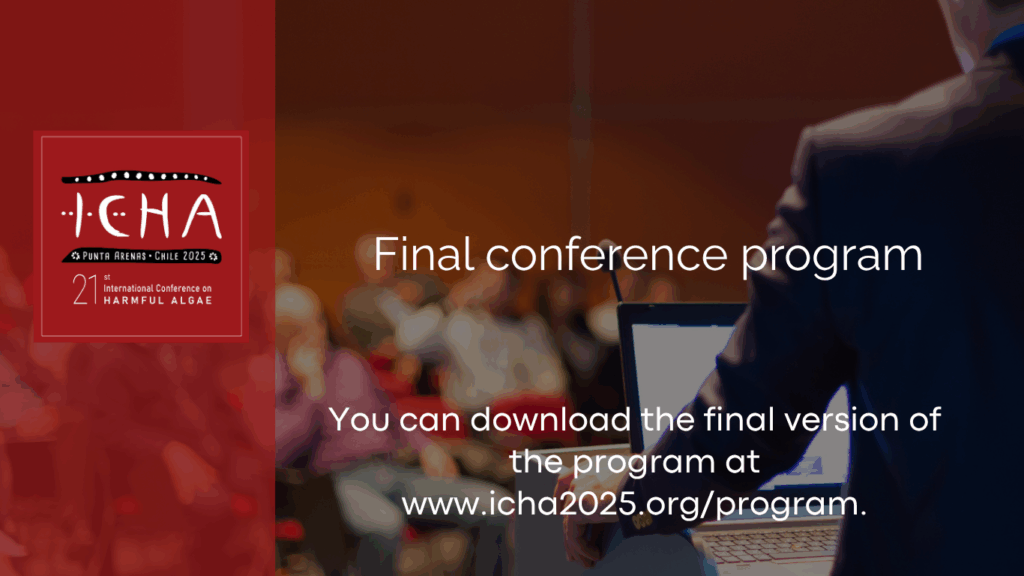Welcome Message from the Local Organising
Committee of ICHA 2025
On behalf of the Local Organising Committee, it is my great pleasure to extend a warm welcome to the twenty-first edition of the International Conference on Harmful Algae (ICHA 2025), which will take place at the southernmost tip of the Americas, in the city of Punta Arenas, Chile, from October 19 to 24, 2025.
We are deeply honoured to have been entrusted with the organisation of this distinguished conference and are committed to providing a rich and stimulating experience for all participants. We hope you will accept our invitation to not only engage with the diverse scientific activities that are the hallmark of ICHA, but also to immerse yourselves in the stunning natural landscapes and cultural richness of Chile’s extreme south. Punta Arenas, often regarded as the gateway to Antarctica, offers a unique backdrop for this gathering, blending natural beauty, historical significance, and scientific relevance.
From this moment forward, we warmly welcome you to the —Magallanes and Chilean Antarctica Region—the southernmost administrative division of Chile. This remarkable area boasts a compelling history, reaching its zenith in the early 20th century before the opening of the Panama Canal. It is also home to fascinating stories of resilience and adaptation by the indigenous peoples who inhabited this land for over 7,000-12,000 years. The conference logo pays homage to two of these sea nomads groups: the Kawésqar, who roamed the northern regions of the Strait of Magellan, and the Yagán, who lived to the south, particularly around the Beagle Channel. You are invited to explore the meaning behind this emblematic logo on the Conference website.
This region is not only culturally and historically significant but also scientifically relevant. Historical records from the late 19th century describe Yaghan communities in the Beagle Channel experiencing paralytic shellfish poisoning symptoms after consuming contaminated mussels. Furthermore, the first recorded bloom associated with paralytic shellfish toxins in this region occurred in Bahía Bell, near Punta Arenas, in the early 1970s. Today, the fjords of southern Chile are home to diverse harmful algal species and associated marine toxins, making Punta Arenas an ideal setting for advancing discussions on harmful algal blooms (HABs).
During the conference week, Punta Arenas will serve as a beacon of scientific exchange and collaboration, illuminating the challenges and opportunities associated with HAB science. The chosen theme, “From HAB Science to Environmental Resilience”, reflects our aspiration to inspire creative solutions, future insights, and technological advancements that address the complex interplay between HABs and environmental sustainability.
We are confident that ICHA 2025 will provide a unique opportunity for scientists from across the globe to interact, share knowledge, and establish the foundations for future collaborative research. Participants will explore the latest advancements in understanding the ecological, societal, and economic impacts of HABs, with a focus on developing predictive tools, mitigation strategies, and control measures. While marine ecosystems remain central to our discussions, the conference will also open the floor to studies of HABs in freshwater systems such as rivers and lakes, offering a comprehensive perspective on this critical global challenge.
As we conclude this message of welcome, we extend our heartfelt invitation for you to join us in Punta Arenas, a city located on the northern shore of the iconic Strait of Magallanes, on the Brunswick Peninsula. This region is part of the renowned Patagonian territory, where the dramatic landscapes reflect the remnants of glaciations that occurred between 40,000 and 10,000 years before present.
We look forward to welcoming you to this extraordinary corner of the world for a week of scientific dialogue, discovery, and camaraderie.

Leonardo Guzmán-Méndez
Senior Researcher, Fisheries Development Institute (IFOP)
Chair of the Local Organising Committee of ICHA 2025 Punta Arenas, Chile




